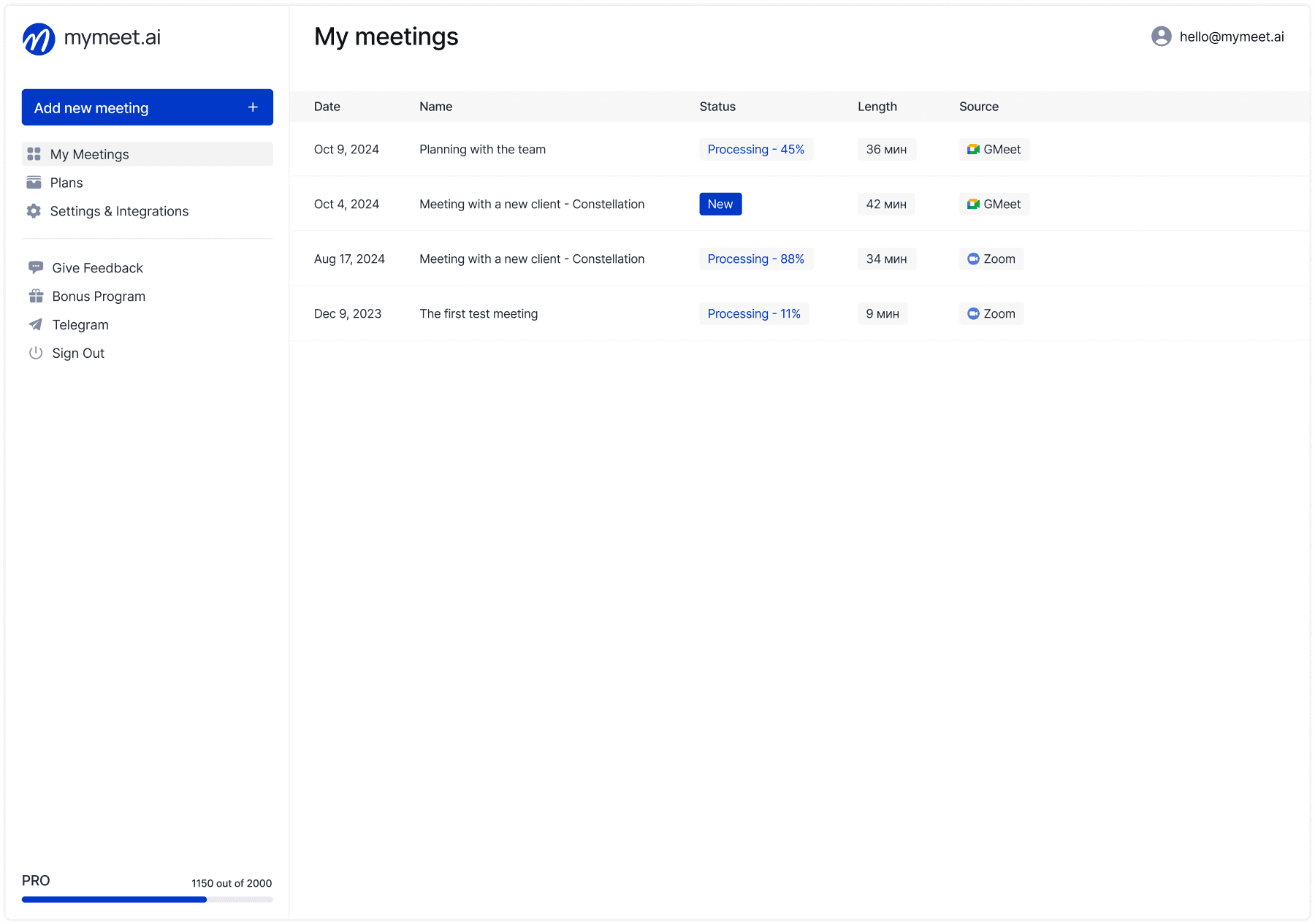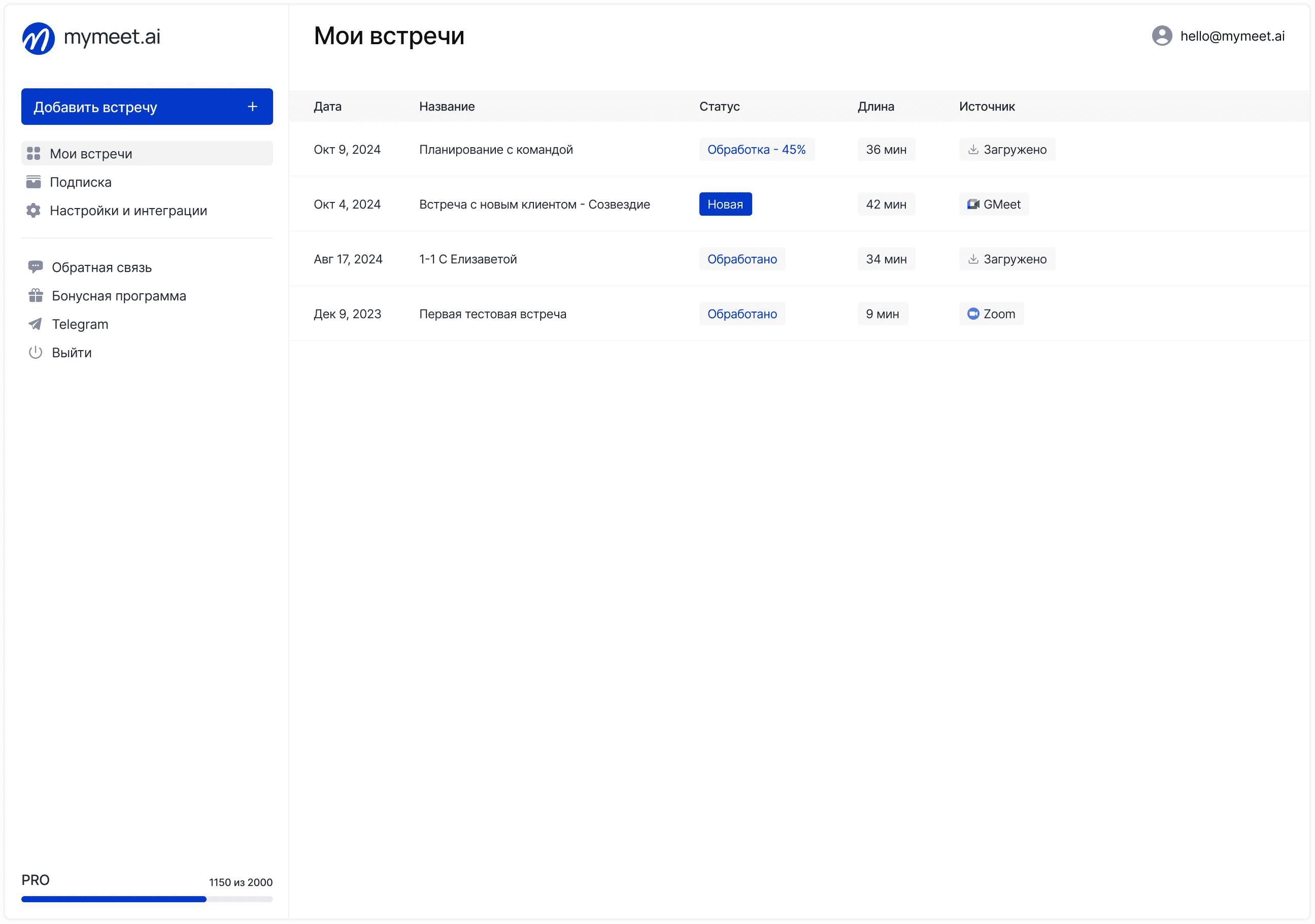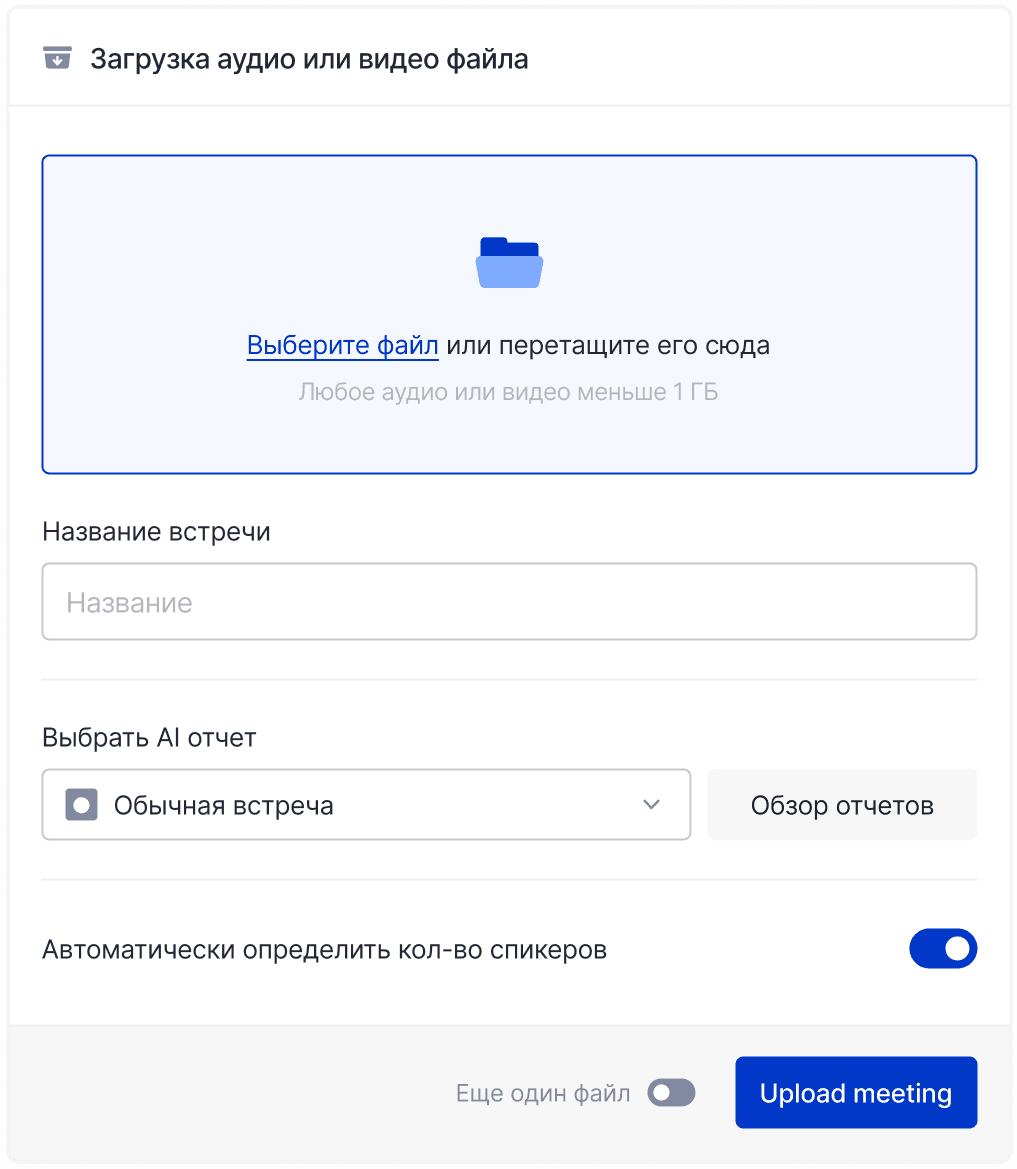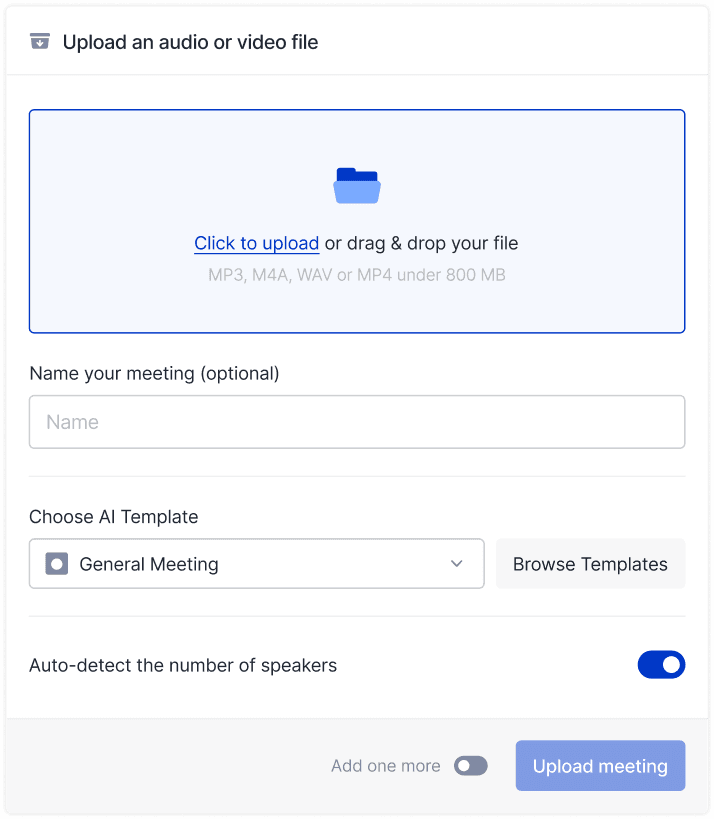Meeting Tips

Andrey Shcherbina
Aug 25, 2025

Microsoft Teams contains over 400 integrations and can replace 15+ corporate applications, but 90% of companies use it only as a Skype replacement — proper configuration turns Teams into a control center for all organizational business processes. Most productivity-enhancing features are hidden in settings or require integration with other Microsoft 365 services.
Hello! The mymeet.ai team has studied Microsoft Teams' corporate capabilities and collected lifehacks from IT directors, project managers, and digital transformation specialists. We'll show you how to transform Teams from a simple messenger into a complete business management platform.
Corporate Teams Settings for Maximum Efficiency
Microsoft Teams is designed for corporate environments, but default settings prioritize simplicity over productivity. Proper configuration can increase team efficiency by 40% through automation of routine processes.
How to Configure Presence Status for Real Productivity
Most employees ignore statuses in Teams, but proper status usage can reduce distractions by 60%. Set up automatic statuses based on activity.
Go to Settings → Privacy and enable "Show when you're in a meeting." Teams will automatically set "In a meeting" status during video calls, preventing unnecessary notifications from colleagues.
Use custom statuses to block time for deep work. Set "Focusing" or "Deep work" status with a 2-4 hour timer. Colleagues will see you're busy with important tasks and won't disturb you without urgent necessity.
Secret function: you can configure automatic status changes when working in specific applications. When you open an IDE for programming or analytical tools, Teams automatically shows "Busy" status.
Notification Optimization for Important Focus
By default, Teams sends notifications about every message in every channel. For a 50-person team, this can be 200+ notifications per day, killing productivity.
Configure notifications by priority: Settings → Notifications → Channel messages → Only for mentions and replies. You'll receive notifications only when personally mentioned or when someone replies to your messages.
Create "Quiet time" in settings — period when Teams don't show notifications. Set 9:00-11:00 for morning concentration and 14:00-16:00 for post-lunch work.
Manager lifehack: create separate "Urgent" channel for critically important messages and configure notifications only for this channel. The team will know messages in this channel require immediate attention.
Interface Personalization for Work Processes
Teams allow interface customization for each employee's work specifics. In the left panel, click "..." and select "Reorder" to change tab order.
For project managers: put Planner and Tasks at the beginning of list
For developers: Files, Wiki, GitHub — first tabs
For HR: Forms, Shifts, Approvals in priority
Hidden capability: you can create personal tabs with external services. Add CRM system tab, analytical dashboards, corporate applications directly to Teams interface.
Teams as Project and Task Management Center
Most companies use Teams only for communication, losing 70% of its project management capabilities. Proper setup turns Teams into complete replacements for specialized task management systems.
How to Turn Channels into Project Spaces
Each Team's channel can become self-sufficient project space with tasks, files, plans and analytics. Create channel structure by projects, not departments.
Instead of "Development Department," "Marketing," "Sales" channels, create "Mobile App Project," "New Product Launch," "Client XYZ." Each channel will have only specific project participants.
Add project management tabs:
Planner — for task planning and deadlines
Files — for all project documents in one place
OneNote — for shared notes and brainstorming
Power BI — for project analytics and reporting
Result: all project information is in one place, participants don't lose context, management gets process transparency.
Task Automation via Microsoft Power Automate
Power Automate (formerly Microsoft Flow) is integrated into Teams and can automate dozens of routine processes. Most users don't even know it exists.
Automatic task creation: configure flow that creates Planner tasks every time "TODO" or "TASK" is mentioned in the channel. No one forgets assignments.
Deadline notifications: create flow that sends reminders to channel 3 days and 1 day before project deadline. The team always knows approaching deadlines.
CRM integration: configure automatic Teams channel creation when a new client is created in CRM. Each client gets separate communication space.
Using Lists for Structured Management
Microsoft Lists — hidden gem in Teams for creating structured databases directly in messenger interface. Replace Excel tables with smart lists with automation.
Create a "Client Requests" list with fields: priority, responsible person, status, deadline. Each new request automatically gets a unique number and is tracked until closure.
Company knowledge base: create FAQ list with categories, tags, usefulness rating. Employees can quickly find answers to typical questions without contacting colleagues.
Equipment inventory: list with equipment, responsible persons, location, status. Automatic reminders about maintenance or update necessity.
Mymeet.ai for Microsoft Teams: AI Analysis of Corporate Meetings

Microsoft Teams offers basic meeting recording, but corporations need deep discussion analysis for extracting business insights and monitoring decision execution. Mymeet.ai integrates with Teams and turns every corporate meeting into structured reports with actionable conclusions.

✅ Automatic connection to Teams meetings — bot joins corporate calls and records all discussions
✅ Corporate analysis templates — special reports for board meetings, strategic sessions, project meetings

✅ Microsoft 365 integration — reports saved to SharePoint, tasks created in Planner, notifications via Outlook
✅ Corporate decision extraction — automatic highlighting of decisions made, budget issues, strategic initiatives
✅ Compliance and security — adherence to corporate security standards and regulatory requirements

✅ Executive dashboards — summaries for management on all corporate meetings and their effectiveness
Corporate Case: Bank Digital Transformation
A large Russian bank uses Microsoft Teams to coordinate a digital transformation program involving 12 departments. Weekly cross-functional meetings became chaotic due to complexity of tracking decisions and assignments between departments. With mymeet.ai, the process became manageable:
Bot automatically connects to all strategic meetings through Teams calendar, analyzes discussions through special banking transformation template — highlights technology decisions, budget issues, regulatory requirements, risks, creates cross-departmental action items with clear responsibility division between IT, business, compliance, integrates with corporate PMO system for automatic project status updates, forms executive summaries for bank board with transformation progress KPIs.
Result: 50% reduction in coordination time between departments, 80% increase in decision execution transparency.
Implement corporate AI analysis in Microsoft Teams. Contact consultant through form to configure system for your corporate processes.

Advanced Teams Functions for Teamwork
Microsoft Teams contains dozens of hidden functions for effective teamwork known only to advanced users. These capabilities can dramatically change company collaboration processes.
Breakout Rooms for Structured Brainstorming
Breakout Rooms function in Teams is more flexible than Zoom but less obvious in usage. During the meeting, click "Breakout rooms" in the control panel and choose "Automatically" for random division or "Manually" for manual distribution.
Secret capability: you can pre-configure Breakout Rooms in meeting settings before it starts. Create groups by roles, projects or expertise in advance.
For brainstorming, use Microsoft Whiteboard in each breakout room. Each group gets a separate board for work, and after reuniting can show results to all participants.
Moderation lifehack: assign "facilitator" to each breakout room — person responsible for leading discussion and recording results. This structures group work and guarantees concrete conclusions.
Polling and Forms for Interactive Engagement
Teams is integrated with Microsoft Forms for creating polls and voting directly during meetings. Click "Apps" during the call and find "Forms."
Create quick polls for decision making: "Which design option do we choose?", "Ready for release?", "Rate this feature importance from 1 to 5." Results are visible in real time to all participants.
Advanced technique: create a poll with multiple questions for collecting feedback after the meeting. Teams automatically send links to all participants via email.
Together Mode for Psychological Comfort
Together Mode places all participants in a virtual auditorium, creating a sense of physical presence. Especially effective for large teams and long meetings.
Function uses AI to create shared background and natural participant arrangement. This reduces "Zoom fatigue" and helps better read colleagues' non-verbal signals.
When to use: team building activities, all-hands meetings, creative sessions. Avoid technical discussions with screen sharing.
Whiteboard for Visual Planning
Microsoft Whiteboard is integrated into Teams and allows creating interactive boards for collaboration. During the meeting, click "Share content" → "Microsoft Whiteboard."
Business templates:
SWOT analysis — ready template for strategic planning
Customer Journey Map — for user experience work
Sprint Planning — for agile teams
Brainstorming — structured brainstorming with idea categorization
All changes save automatically and are accessible to all participants via OneDrive after meeting.
Teams Integration with Office 365 and Corporate Systems
Microsoft Teams' true power is revealed through integrations with Microsoft 365 ecosystem and external corporate systems. Proper setup turns Teams into a single access point for all work tools.
Seamless Integration with Office Applications
Teams allows editing Office documents directly in the messenger interface without switching between applications. In any channel, click "Files" → "New" to create Word, Excel or PowerPoint documents.
Real-time collaborative editing: multiple people can simultaneously work on documents directly in Teams. Changes are visible to all participants instantly, versions save automatically to SharePoint.
Secret function: you can open Excel spreadsheet in Teams and simultaneously discuss data in video call. Participants see each other's cursors and can point to specific cells during conversation.
Power Platform for Corporate Automation
Power Platform (Power Apps, Power Automate, Power BI) is fully integrated into Teams and allows creating corporate applications without programming.
Power Apps in Teams: create applications for vacation requests, equipment orders, visitor registration. Application works directly in the Teams channel, data saves to the corporate database.
Power BI dashboards: add analytical reports as tabs in channels. The sales team sees real-time KPIs, the IT department tracks system performance, and HR analyzes employee engagement.
Power Automate workflows: automate approval processes. Purchase request automatically goes to the manager, after approval creates a task in the procurement department, sends notification to the initiator upon completion.
Integration with External Corporate Systems
Teams supports 400+ integrations with external services through Microsoft AppSource. Add necessary applications directly to channels.
CRM integrations: Salesforce, Dynamics 365, HubSpot. Receive notifications about new leads, deal updates, approaching deadlines directly in Teams.
Project management: Jira, Trello, Asana, Azure DevOps. Create tasks, track progress, receive change notifications without leaving Teams.
Analytics and monitoring: Google Analytics, New Relic, Datadog. Critical alerts and business metrics available directly in corporate channels.
Unified Corporate Ecosystem
Integration goal — create unified workspace where employees can complete 80% of tasks without leaving Teams. Configure personal dashboards for different roles:
Manager: Power BI with KPIs, meeting calendar, approval center, executive alerts
Project manager: Planner with tasks, Gantt charts, resource planning, team communication
Developer: GitHub notifications, build status, code reviews, technical documentation
Marketer: Campaign analytics, social media monitoring, content calendar, lead notifications
Hotkey | Function | Application |
Ctrl + Shift + O | Search people and content | Quick search across organization |
Ctrl + . | Show commands | List of all available commands |
Ctrl + Shift + A | Open Apps | Quick access to integrated applications |
Ctrl + Shift + P | Open files | Search documents across all channels |
Alt + Shift + C | Start video call | Instant meeting launch |
Solving Corporate Teams Problems
The corporate environment creates specific Team problems related to security, performance and integration with existing systems. Understanding corporate architecture helps quickly diagnose and solve problems.
Microsoft Teams in the corporate environment works through multiple layers: Azure Active Directory for authentication, Exchange Online for calendars, SharePoint for files, Skype for Business infrastructure for video communication. Problems at any level can affect a team's operation.
"Teams Works Slowly" — Corporate Performance Optimization
What happens: Teams load slowly, messages deliver with delay, video calls interrupt, interface "lags."
In a corporate environment, Teams can conflict with antiviruses, proxy servers, and Windows group policies. The IT department often configures strict security restrictions that affect performance.
Corporate diagnostics:
Check corporate antivirus exclusions for Teams
Configure proxy bypass for *.teams.microsoft.com and *.skype.com
Ensure Teams isn't blocked by Windows Defender or corporate firewall
Clear Teams cache: close application, delete %appdata%\Microsoft\Teams, restart
System optimization: ask the IT department to add Teams to trusted applications list to reduce security system overhead.
"SharePoint Integration Not Working" — Access Rights Issues
What happens: files don't open in Teams, errors when trying to create documents, synchronization doesn't work.
Teams use SharePoint for storing all channel files. If SharePoint access rights are configured incorrectly, integration breaks. Often the problem is conflict between Teams and SharePoint rights.
Access rights diagnosis:
Check access to corresponding SharePoint site through browser
Ensure user has "Contribute" rights on SharePoint site
Check group policies — some organizations block automatic SharePoint site creation
Solution through IT administrator: ask for Site Collection Administrator rights for channel or recreate Teams-SharePoint integration.
"Video Calls Don't Work in Corporate Network" — Network Connectivity Issues
What happens: audio and video don't work, constant connection breaks, participants can't join meetings.
Corporate firewalls often block ports and protocols necessary for Teams video communication. WebRTC requires open UDP ports that many IT departments block for security reasons.
Network requirements for IT:
Open ports 50000-59999 UDP for media traffic
Allow access to *.teams.microsoft.com, *.skype.com
Configure QoS for Teams traffic prioritization
Check bandwidth — Teams requires minimum 1.5 Mbps for HD video
Temporary solution: use mobile internet to connect to critically important meetings while IT configures corporate networks.
"Messages and Files Disappear" — Synchronization Issues
What happens: messages deliver with delay, files disappear from channels, chat history doesn't sync between devices.
Teams synchronize data through Microsoft Graph API with multiple failure points: Azure AD, Exchange Online, SharePoint Online. Problems with any service affect synchronization.
Microsoft services status check:
Open admin.microsoft.com → Service health
Check Teams, SharePoint, Exchange Online status
Look at active incidents and planned maintenance
Synchronization recovery:
Sign out of Teams on all devices
Clear application cache
Sign in again — Teams will re-sync all data from cloud
Problem | Cause | Solution | Responsible |
Slow performance | Corporate security | Configure exclusions | IT department |
No file access | SharePoint rights | Check permissions | SharePoint admin |
Video not working | Port blocking | Open UDP 50000-59999 | Network admin |
Data not syncing | M365 issues | Check Service Health | Microsoft support |
Conclusion: Turn Teams into Corporate Operating System
Microsoft Teams has potential to become the central nervous system of modern corporations, but realizing this potential requires systematic approach and deep understanding of corporate processes. Start with basic Office 365 integrations, master Power Platform for automation.
Next step — create unified project workspaces with integration of all necessary tools. Final stage — automate corporate communication analysis for extracting strategic insights.
Properly configured Teams can replace dozens of corporate systems and become the foundation of organizational digital transformation.
Realize Microsoft Teams' corporate potential. Try mymeet.ai for free — 180 minutes of corporate meeting processing with integration into your business processes. Start transformation
Frequently Asked Questions: Microsoft Teams Lifehacks
Microsoft Teams hotkeys — which are most useful for work?
Ctrl+Shift+O for people search, Ctrl+. for commands, Ctrl+Shift+A for Apps, Alt+Shift+C for video call. These combinations cover 80% of daily Teams actions and save navigation time.
How to configure Teams statuses for increased productivity?
Enable automatic statuses in Privacy settings, use custom statuses "Focusing" or "Deep work" with timer, set "Quiet time" to block notifications during concentration hours.
Team Office integration — how to work with documents inside Teams?
Create documents through Files → New directly in channel, use real-time collaborative editing, open Excel in Teams to discuss data during video calls with pointing to specific cells.
How to use Power Automate in Teams for automation?
Create flows for automatic task creation when "TODO" is mentioned, configure deadline notifications, automate channel creation for new CRM clients, set up approval processes for requests.
Microsoft Teams Breakout Rooms — how to use them effectively?
Configure groups in advance in meeting settings, assign facilitators to each group, use Whiteboard for work, create structured assignments with clear results for each group.
How to solve Team performance issues in corporate networks?
Ask IT to add Teams to antivirus exclusions, configure proxy bypass for *.teams.microsoft.com, open UDP ports 50000-59999, check bandwidth and configure QoS for Teams traffic prioritization.
Team Lists vs Excel — when to use Lists?
Lists better for structured data with automation: client requests, inventory, FAQ databases. Use Excel for calculations and analysis. Lists integrate with Power Automate for creating workflows.
How to configure Teams as project management centers?
Create project-based channels, add Planner, OneNote, Power BI tabs, use Microsoft Project for Gantt charts, configure external PM system integrations through AppSource.
Microsoft Teams Together Mode — when to use this function?
Effective for team building, all-hands meetings, creative sessions, long meetings to reduce fatigue. Avoid technical discussions with screen sharing or detailed document work.
How to integrate Teams with external corporate systems?
Use Microsoft AppSource for ready integrations with CRM, project management, analytics systems. For custom integrations, apply Microsoft Graph API or Power Platform connectors for creating custom workflows.
Andrey Shcherbina
Aug 25, 2025







